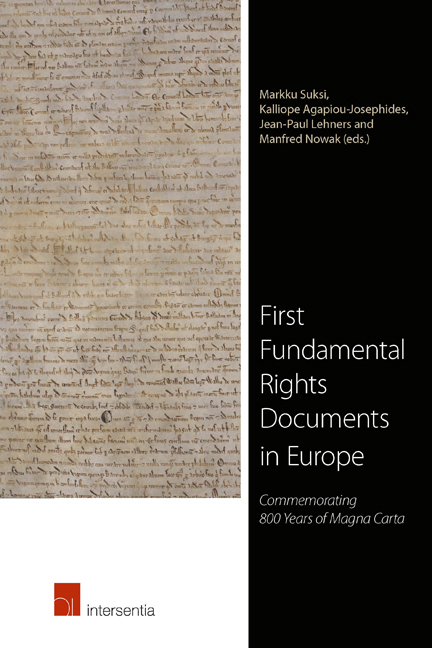Book contents
- Frontmatter
- Preface
- Contents
- List of Authors
- 1 Introduction
- PART I
- 2 The United Kingdom: From Magna Carta 1215 to the Rule of Law
- 3 Ireland: Individual and Group Rights in Ancient Irish Law
- 4 Italy: The Liber Paradisus — A Vision of Good Governance
- 5 Hungary: The Historic Constitution as the Place of Memory
- 6 Belgium: From Collective Privileges to Individual Rights
- 7 Austria: Manorial Regulation of Mining and Use of Forests as Potential Antecedents in Fundamental Rights
- 8 Spain: The First Cry for Justice in the Americas — From Antonio de Montesinos to the Laws of Burgos (1512)
- 9 Lithuania: From Equality to Inequality and to Equality Again
- 10 Poland: From the Golden Liberty of the Nobles to Fundamental Rights
- PART II
- Index
7 - Austria: Manorial Regulation of Mining and Use of Forests as Potential Antecedents in Fundamental Rights
from PART I
Published online by Cambridge University Press: 15 December 2017
- Frontmatter
- Preface
- Contents
- List of Authors
- 1 Introduction
- PART I
- 2 The United Kingdom: From Magna Carta 1215 to the Rule of Law
- 3 Ireland: Individual and Group Rights in Ancient Irish Law
- 4 Italy: The Liber Paradisus — A Vision of Good Governance
- 5 Hungary: The Historic Constitution as the Place of Memory
- 6 Belgium: From Collective Privileges to Individual Rights
- 7 Austria: Manorial Regulation of Mining and Use of Forests as Potential Antecedents in Fundamental Rights
- 8 Spain: The First Cry for Justice in the Americas — From Antonio de Montesinos to the Laws of Burgos (1512)
- 9 Lithuania: From Equality to Inequality and to Equality Again
- 10 Poland: From the Golden Liberty of the Nobles to Fundamental Rights
- PART II
- Index
Summary
INTRODUCTION
Research on fundamental rights is a relatively young scientific field, with the last three decades seeing a particular boom in research on the early history of these rights. Notable here are the efforts towards an interdisciplinary approach, for instance to situate legal terms in a historical context and to explain them in this context (of origin) — long before one can speak of ‘inherent’ and ‘inalienable’ rights, in a modern sense, to which every individual is entitled. The origin of the ‘rights of the individual’ thus dates, depending on the study field, from ancient Greece to the early modern period.
For the purposes of the preceding explanation, the question of when fundamental rights were guaranteed or applied for the first time in Austria must be considered complex and equivocal for several reasons. When trying to trace their early history, the chronological and geographical scope of Austria that one focuses on must be clarified, and, as a consequence, also the corresponding sources regarding the content/aspect of fundamental rights that could be consulted. In this context, the reasons and causes for the granting of rights as well as the beneficiaries of these rights, have to be considered. These rights were not only formulated as privileges (exceptional laws, prerogatives), but also as private documents regulating legal matters addressing only a small, select group. Hegemonial territorial law codes or ‘handfasts’, which included issues which we now understand as fundamental rights (for example, the King's peace) were directed towards all subjects of the respective sovereign but they had the character of a commitment or a duty. Thus, in the late Middle Ages and the early modern period, the Austrian ancestral lands were still far from guaranteeing indivisible, fundamental rights for the benefit of the general public. Felix Ermarcora, for example, in an article on the development of human rights and fundamental freedoms, has pointed out that, when discussing the Middle Ages and early modern period, it is linguistically (more) correct to speak of the ‘idea of human rights’.
GENERAL FEATURES OF THE DEVELOPMENT OF FUNDAMENTAL RIGHTS
Until the appearance of humanism north of the Alps during the fifteenth century, and the resulting reception of Roman law one can consider there to have been a human duties canon rather than a human rights canon.
- Type
- Chapter
- Information
- First Fundamental Rights Documents in EuropeCommemorating 800 Years of Magna Carta, pp. 85 - 92Publisher: IntersentiaPrint publication year: 2015



